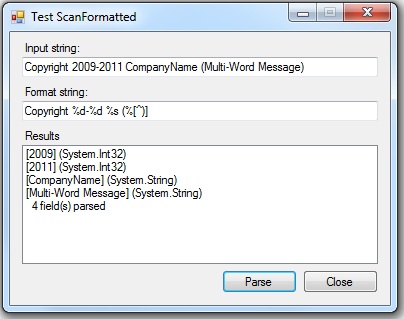C: Character: The next character. If a width other than 1 is specified, the function reads exactly width characters and stores them in the successive locations of the array passed as argument. No null character is appended at the end. S: String of characters: Any number of non-whitespace characters, stopping at the first whitespace character found. A terminating null character is automatically added at the end of the stored sequence.
- The C Standard Library
- C Standard Library Resources
C++ Scanf String
- C Programming Resources
- Selected Reading
Description
The C library function int scanf(const char *format, ...) reads formatted input from stdin.
Declaration
Following is the declaration for scanf() function.
Parameters
format − This is the C string that contains one or more of the following items −
Whitespace character, Non-whitespace character and Format specifiers. A format specifier will be like [=%[*][width][modifiers]type=] as explained below −
| Sr.No. | Argument & Description |
|---|---|
| 1 | * This is an optional starting asterisk indicates that the data is to be read from the stream but ignored, i.e. it is not stored in the corresponding argument. |
| 2 | width This specifies the maximum number of characters to be read in the current reading operation. |
| 3 | modifiers Specifies a size different from int (in the case of d, i and n), unsigned int (in the case of o, u and x) or float (in the case of e, f and g) for the data pointed by the corresponding additional argument: h : short int (for d, i and n), or unsigned short int (for o, u and x) l : long int (for d, i and n), or unsigned long int (for o, u and x), or double (for e, f and g) L : long double (for e, f and g) |
| 4 | type A character specifying the type of data to be read and how it is expected to be read. See next table. |
fscanf type specifiers
Scanf String Dev C Tutorial
| type | Qualifying Input | Type of argument |
|---|---|---|
| c | Single character: Reads the next character. If a width different from 1 is specified, the function reads width characters and stores them in the successive locations of the array passed as argument. No null character is appended at the end. | char * |
| d | Decimal integer: Number optionally preceded with a + or - sign | int * |
| e, E, f, g, G | Floating point: Decimal number containing a decimal point, optionally preceded by a + or - sign and optionally followed by the e or E character and a decimal number. Two examples of valid entries are -732.103 and 7.12e4 | float * |
| o | Octal Integer: | int * |
| s | String of characters. This will read subsequent characters until a whitespace is found (whitespace characters are considered to be blank, newline and tab). | char * |
| u | Unsigned decimal integer. | unsigned int * |
| x, X | Hexadecimal Integer | int * |

additional arguments − Depending on the format string, the function may expect a sequence of additional arguments, each containing one value to be inserted instead of each %-tag specified in the format parameter, if any. There should be the same number of these arguments as the number of %-tags that expect a value.
Return Value
On success, the function returns the number of items of the argument list successfully read. If a reading error happens or the end-of-file is reached while reading, the proper indicator is set (feof or ferror) and, if either happens before any data could be successfully read, EOF is returned.
Example
The following example shows the usage of scanf() function.
Let us compile and run the above program that will produce the following result in interactive mode −